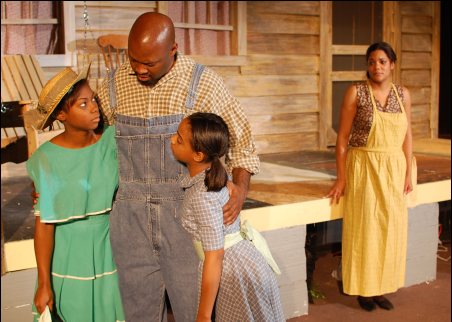Jordan Wright
February 2011
Special to The Alexandria Times

Marissa Moody as Joyce Cheeks, DeJeannette Horne as Rawl Cheeks, Aeshia Brown as Matoka Cheeks, Lolita-Marie as Mattie Cheeks Cal - photo credit Ari McSherry
Before you “get all up in my family’s business,” as matriarch Mattie Cheeks is fond of telling Jewish traveling scholar and Holocaust survivor, Yaveni Aaronsohn, there is a perfectly plausible reason why this play uses the “N” word and why its usage, in any other context except historical, is so derogatory.
Brooklyn-born John Henry Redwood, an African-American actor and playwright, aimed to shock his audiences, shock them clear out of their complacency, in order to remind them of the invidiousness of the segregated South, not only for Blacks but for Jews as well.
In his play, “No Niggers, No Jews, No Dogs” presented by Alexandria’s Port City Playhouse, Redwood urges us not to forget the signs of racism, “Coloreds only”, “No niggers”, “Whites only”, and other hate-filled descriptors posted on restaurants, drinking fountains, rest rooms, hotels, gas stations and storefronts in the pre-civil rights South when fear-mongering, lynching, systematic rape and humiliation were promulgated and carried out by the Ku Klux Klan and their sympathetic followers.
The time was summer and the year was 1949 when Aaronsohn shows up in Halifax, North Carolina to study “the negative psychological effects of prejudice” on an African-American family. He finds the Cheeks’ home where husband, Rawl, played with a masterful subtleness by DeJeanette Horne, is a sharecropper and wife Mattie takes in laundry while raising their two girls, Joyce and Matoka during the days of Jim Crow law, and offers to pay them for their participation. Although initially suspicious the family comes to share their story with him and the complexities of their lives are revealed.
Beautifully paced and soulfully delivered this provocative yet tender and funny memory piece presents a cautionary tale…one that should never be forgotten.
In an unforgettably moving performance the beautiful and dulcet-voiced Lolita-Marie as the indomitable Mattie delivers an exquisite portrayal of a woman of grace and strong convictions whose canniness saves her family from certain doom. “You think life started when your life started?” she asks her children.
Also outstanding is ten-year old Aeshia Brown, playing the sweetly precocious daughter, Matoka, with the timing and delivery of a pro. “I’m studying you,” she informs Aaronsohn, as he records her explanation of the world. Her pivotal role, handled with sass and aplomb, providing the necessary comic relief.
The action takes place on or around the front porch – an iconic setting for Southern family life – where doors are slammed, peas are shelled, secrets are revealed and baskets of food are left for the mysterious Aunt Cora. Set Designer Erin Cumbo cleverly employs a clothesline hung with sheets as a projection screen for the opening photographs of racist signage from the South’s painful history.
“My father was an historian who taught me history could be sad,” recalls the playwright’s daughter, Rhonda Redwood-Ray, a federal prosecutor in Washington, DC. “Because he grew up around a lot of strong women, he was innately sensitive to women. Many of his characters were drawn from his own life.”
“Aunt Cora was a younger sister to my grandfather, and Mattie, my father’s mother is still alive at 90 and lives in Halifax, North Carolina,” she explains, acknowledging that her own father was probably the model for Rawl Cheeks.
Redwood-Ray remembers a childhood that included going to the homes of her father’s Jewish friends for supper where she was taught to be respectful of the customs of others and where she witnessed her father’s great sense of humor. “He had a laugh that would shake this whole set,” she told the audience recently in a talk after the show at the company’s newest location.
Weekends through March 6th at The Lab at Convergence, 1819 North Quaker Lane, Alexandria, VA 22302. For tickets and information call 703 838-2880 or visit www.PortCityPlayhouse.com.
Leave a Reply